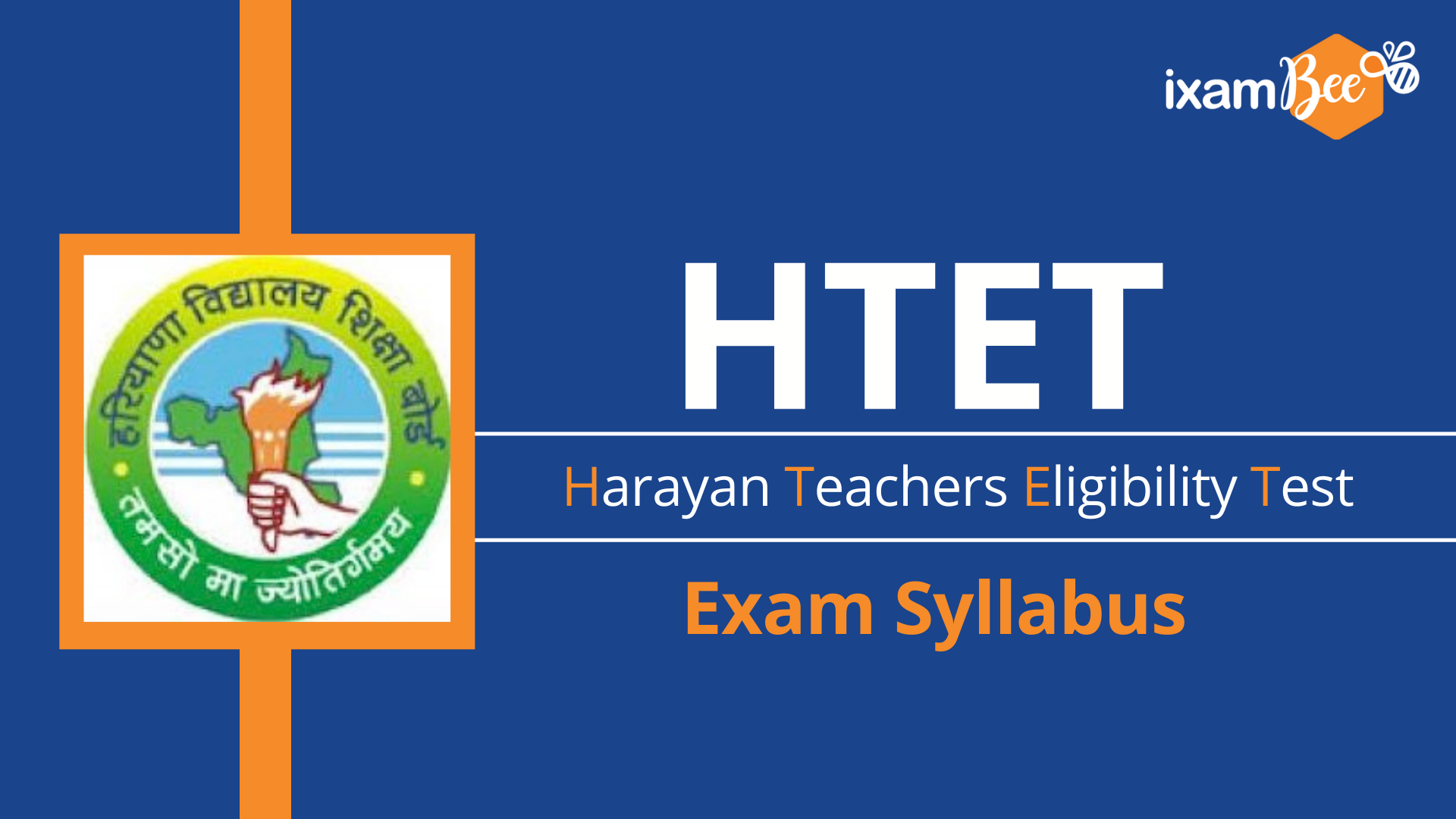- Details
- Ask Us?

Before starting preparation for the HTET Exam 2025 it is very important for a candidate to be well versed about the HTET syllabus. The syllabus of HTET is different for all three levels. The subjects included in all three levels are Environmental Studies, Child Development and Pedagogy, Languages (Hindi and English), General Studies (Quantitative Aptitude, Haryana G.K. and Reasoning), Mathematics and opted subject. It is advised to a candidate to go through the full HTET syllabus 2025 first and then proceed with making a preparation strategy for the HTET exam 2025.
HTET Exam Syllabus 2025 - (Principal, Vice Principal)
| Section | Topics |
|---|---|
| English Language | Synonyms, Homonyms, Antonyms, Spelling, Word formation, Idioms and phrases, Fill in the suitable words, Grammar, Spotting errors, Sentence correction, Active/ passive voice, Phrases and idioms, Direct and indirect speech, Reading Comprehension, Passage completion, Theme detection, Deriving conclusion, Rearrangement of passage |
| General Hindi | विपरीतार्थक शब्द, पर्यायवाची शब्द, मुहावरे तथा लोकोक्तियां, गुढार्थी (क्लोजटाइप), प्रकार का गद्यांश, वाक्य क्रमव्यवस्थापन, वाक्यों में त्रुटियाँ, वाक्यों में रिक्त-स्थानों की पूर्ति, वर्तनीअशुद्धियाँ, वाक्यांश के लिए एक शब्द, अपठित गद्यांश |
| Reasoning | Analogy, Classification, Word formation, Statement and conclusions, Syllogism, Statement and assumptions, Statement and arguments, Coding decoding, Blood relations, Passage and conclusions, Alphabet test, Series test, Number, ranking and time sequence, Direction sense test, Decision-making test, Figure series, Input/output, Assertion and reasoning, Sitting arrangement, Odd figure out, Analogy, Series test, Miscellaneous test |
| General Awareness/Current Affairs | Science – Inventions & Discoveries, Indian Constitution, Geography, Budget and Five Year Plans, History, Scientific Research, Important Financial & Economic News, Culture, Economy, Current Affairs – National & International, India and its neighbouring countries, General Politics, Sports, Economy, Banking, and Finance, Knowledge of Current Events, Countries & Capitals |
| Computer Literacy | History of computers, Basics of hardware and software, Windows operating system, basics Internet terms and services, Basic functionalities of MS-Office (MS-word, MS-Excel, MS-PowerPoint), Networking and communication, Database basics, Basics of hacking,Security tools and viruses |
| Child Development and Pedagogy | Dimensions of Development
|
| Perspectives in Education and School Organization |
|
| Teaching – Learning | Understanding Learning
|
| Administration & Finance |
|
HTET Exam Syllabus 2025 - (TGT and PGT)
| Section | Topics |
|---|---|
| English Language | Synonyms, Homonyms, Antonyms, Spelling, Word formation, Idioms and phrases, Fill in the suitable words, Grammar, Spotting errors, Sentence correction, Active/ passive voice, Phrases and idioms, Direct and indirect speech, Reading Comprehension, Passage completion, Theme detection, Deriving conclusion, Rearrangement of passage |
| General Hindi | विपरीतार्थक शब्द, पर्यायवाची शब्द, मुहावरे तथा लोकोक्तियां, गुढार्थी (क्लोजटाइप), प्रकार का गद्यांश, वाक्य क्रमव्यवस्थापन, वाक्यों में त्रुटियाँ, वाक्यों में रिक्त-स्थानों की पूर्ति, वर्तनीअशुद्धियाँ, वाक्यांश के लिए एक शब्द, अपठित गद्यांश |
| Reasoning | Analogy, Classification, Word formation, Statement and conclusions, Syllogism, Statement and assumptions, Statement and arguments, Coding decoding, Blood relations, Passage and conclusions, Alphabet test, Series test, Number, ranking and time sequence, Direction sense test, Decision-making test, Figure series, Input/output, Assertion and reasoning, Sitting arrangement, Odd figure out, Analogy, Series test, Miscellaneous test |
| General Awareness/Current Affairs | Science – Inventions & Discoveries, Indian Constitution, Geography, Budget and Five Year Plans, History, Scientific Research, Important Financial & Economic News, Culture, Economy, Current Affairs – National & International, India and its neighbouring countries, General Politics, Sports, Economy, Banking, and Finance, Knowledge of Current Events, Countries & Capitals |
| Computer Literacy | History of computers, Basics of hardware and software, Windows operating system, basics Internet terms and services, Basic functionalities of MS-Office (MS-word, MS-Excel, MS-PowerPoint), Networking and communication, Database basics, Basics of hacking,Security tools and viruses |
| PART III: Teaching Aptitude / Pedagogy |
|
| PART IV: Subject Knowledge |
|
Books
To prepare for HTET exam 2025, you should ensure that you have the best study material possible available around you. Therefore, ixamBee has put together a list of important HTET books useful for level 1, 2 and 3 exam. You can check useful HTET books in the table given below.
| Paper | Book | Author / Publisher |
|---|---|---|
| General English | English Grammar | Wren & Martin |
| Made Easy for English | Norman Lewis | |
| Descriptive General English | SP Bakshi | |
| Computer Literacy | Objective Computer Awareness | Arihant |
| Quantitative Aptitude | Quicker Mathematics | BSC Publications |
| Quantitative Aptitude | RS Agarwal | |
| Class Notes | SS Bharti | |
| General Awareness | Manorama Year Book 2025 | - |
| Pratiyogita Darpan | - | |
| Lucent’s General Knowledge | - | |
| Reasoning | Verbal and Non-Verbal Reasoning | R. S. Aggarwal |
| A new approach to Reasoning | B.S. Sijwali & S. Sijwali Arihant | |
| Analytical Reasoning | M.K Pandey | |
| Multi Dimensional Reasoning | Mishra & Kumar Dr. Lal | |
| Reasoning Book for Competitive Examinations | Pearson | |
| General Hindi | General Hindi | Dr. Jaypal Sharma / Vidhyapeeth Times |
| General Hindi (Saamaany Hindi/सामान्य हिन्दी) | Dr. Rajendra Kumar Singhvi / RHGA Rajasthan Hindi Granthagar Academy | |
| Child Development and Pedagogy | Child Development and Pedagogy with Previous Year Papers 2011-19 | Himanshi Singh |
| Pedagogy And Child Development | Prateek Shivalik | |
| Perspectives in Education and School Organization | Perspectives In Education | Dr. P. Yakaiah |
| Perspective of Education | Khemka Jyoti | |
| Teaching – Learning | Learning And Teaching | Dr. S.C Oberoi |
| Administration & Finance | Administrative Thinkers | D. Ravindra Prasad |


